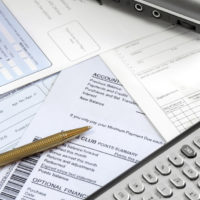Bankruptcy in Florida |Debt Collectors Seizing Wages

The Huffington Post recently reported on how people with overdue bills are often harassed by debt collectors who use intimidating tactics, such as late-night phone calls and frightening in-person visits, to attempt to extract money from indebted consumers. If debt collectors are seizing your wages, freezing your bank accounts, or foreclosing on your property in the West Palm Beach area, a bankruptcy attorney in Florida can help you take control of your circumstances and put you on track to a better financial future.
Debt Collectors
As noted by finance industry experts, millions of Americans are behind in their credit card payments, have defaulted on student or auto loans, or are facing mortgage foreclosure.
Many of these indebted Americans also have been contacted or approached by debt collectors and collection agencies, either by phone, letter, or in person.
Debt collectors are companies hired by credit card issuers and banks to collect on past-due accounts. These are called “third party” debt collectors because they are collecting on the debt owed to another.
Debt collectors also may purchase bad credit card debt and other loan debt from these financial institutions and other lenders. Debt collectors who purchase debts own the debt itself and the right to collect the full amount of the outstanding debt. These are called “first party” debt collectors because they are collecting a debt which they now own.
Debt collection in America is a big business. According to the Association of Credit and Collection Professionals, in 2010, collection agencies collected nearly $54.9 billion in debt from consumers, on which they were paid $10.3 billion in commissions.
High Pressure Debt Collection Tactics And Abuse By Collection Agencies
Federal law prohibits debt collectors from using abusive, unfair, or deceptive practices to collect debts from consumers. This covers personal, family, and household debts, including money you owe on any personal credit card accounts, auto loans, medical bills, or mortgage. This does not cover debts incurred to run a business.
Under the Fair Debt Collection Practices Act (FDCPA), a debt collector cannot contact you at inconvenient time or places, such as before 8 a.m. or after 9 p.m., unless you agree to it. Debt collectors also cannot contact you at work if you tell them (either orally or in writing) that you are not allowed to receive personal calls there.
If you have an attorney representing you about the debt, the debt collector must contact the attorney about the debt, rather than you. Debt collectors are prohibited from contacting people other than you (or your attorney), except to find out your address, your home phone number, and where you work. They also generally are not permitted to discuss your debt with anyone else.
Despite the prohibitions established by the Fair Debt Collections Act, debt collectors notoriously engage in the following prohibited activities:
– Harassment: debt collectors cannot harass, oppress, or abuse you or any of your contacts. They cannot:
-
Use threats of violence or harm;
-
Publish a list of names of people who have not paid their debts;
-
Use profane or obscene language; or
-
Repeatedly contact you by phone for the purpose of annoying you.
– False statements: debt collectors cannot lie when they are trying to collect a debt. This means they cannot:
-
Falsely claim to be an attorney or government agent;
-
Falsely claim that you have committed a crime;
-
Misrepresent that you owe money;
-
Falsely claim that collection agency papers are legal forms if they are not, or vice versa;
-
Falsely represent that they work for a credit reporting company;
-
Falsely threatening legal action (such as seizure, garnishment, attachment, or foreclosure) against you;
-
Use a false company name when contacting your or others about you;
-
Give false credit information about you to anyone; or
-
Send you anything that is intended to look like an official court or governmental agency document.
Unfair practices: debt collectors cannot engage in oppressive or unconscionable acts or practices such as:
-
Trying to collect interest, fees, or other charges unless these are allowed by the underlying contract or state law;
-
Depositing a post-dated check early; or
-
Contacting you by postcard or otherwise revealing personal information.
Damages For Violations of the Fair Debt Collection Practices Act
If a debt collector violates the provisions of the Fair Debt Collection Practices Act, you have the right to sue the collector in state or federal court. Any action must be filed within one year from the date the law was violated.
If you win, the debt collector can be ordered to pay you for any damages caused by its illegal actions. Damages can include lost wages, medical bills, as well as your attorney’s fees and costs. The debt collector also can be ordered to pay you up to $1,000
Recovery under Florida state law may also apply. This is important because, under HB 413 signed on June 13, Florida third-party debt collectors will be subject to new requirements effective October 1, 2014.
Help Making Your Debts Go Away
Even if a debt collector violates the FDCPA in trying to collect a debt, the debt does not go away if you owe it.
However, filing for bankruptcy relief will allow you to discharge your debts and give you a fresh financial start. There are a couple of options when it comes to filing for bankruptcy relief. To find one that best meets your personal needs and situation, call the experienced bankruptcy attorneys at the Law Office Of Kelley Kaplan & Eller at 561-264-6850.



